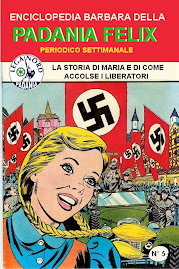Scusate ma non ho resistito,ho molti amici cuochi e sono sicuro che troveranno la cosa estremamente divertente e non è affatto escluso che ci si provino alla ritrattistica Arrosto al forno!
Ad aver realizato "l'opera" d'arte commestibile è una nota agenzia pubblicitaria,tutto sommato è abbastanza intuibile,desumibile dalle immagini come procedere per un perfetto colpo di scena a tavola un po più in là dei raffinati effetti estetici della decorazione alla moda nei ristoranti che vi mettono a dieta.
Rammento che il gusto per la scultura in cucina e le sue sorprese apparteneva alle tavole dei Principi sin dal Rinascimento e Leonardo da Vinci partecipava a pieno titolo nella organizazione degli svaghi alla corte dei Gonzaga credo a Mantova.
Ma sopratutto come dimenticare l'Arcimboldo,insomma da pura e semplice curiosità siamo finiti alle cose serie.
Advertising agency Karmarama recreated the famous 1914 “Lord Kitchener Wants You” poster in meat for Colman's Mustard. The 1914 poster featured British Field Marshal Horatio Herbert Kitchener calling upon Britons to the join the country’s effort in the First World War. With this beautiful imitation, Karmarama hopes to motivate customers to eat Colman’s mustard along with meat.
The whole setup took over 18 hours of cooking and was pieced together by food stylist Peta O'Brian using 16 types of meat.
The ad features the following:
Breaded Ham
Chorizo
Beef Carpaccio
Bresola
Ginger Pig Bacon
Beef Skirt
Roast Duck
Chicken Breast
Brisket
Pepperami
Fillet Steak
Sausages
Beef Steak
Bacon Joint
Leg of Lamb
Plus duck wings for the ears.
Breaded Ham
Chorizo
Beef Carpaccio
Bresola
Ginger Pig Bacon
Beef Skirt
Roast Duck
Chicken Breast
Brisket
Pepperami
Fillet Steak
Sausages
Beef Steak
Bacon Joint
Leg of Lamb
Plus duck wings for the ears.






Ti è piaciuto l'articolo? Vota Ok oppure No. Grazie Mille!
Puoi votare le mie notizie anche in questa pagina.
Puoi votare le mie notizie anche in questa pagina.













0 commenti:
Posta un commento
"Rifiutare di avere opinioni è un modo per non averle. Non è vero?" Luigi Pirandello (1867-1936)